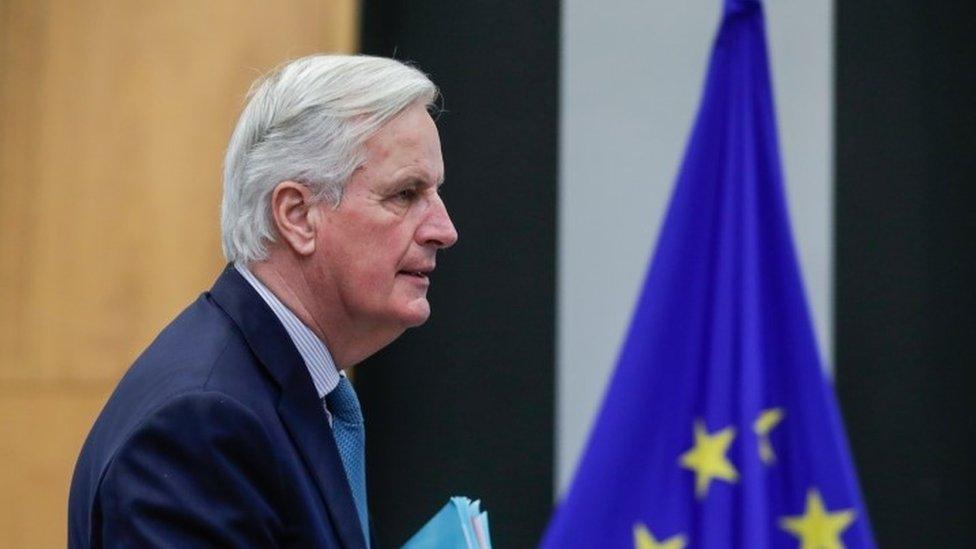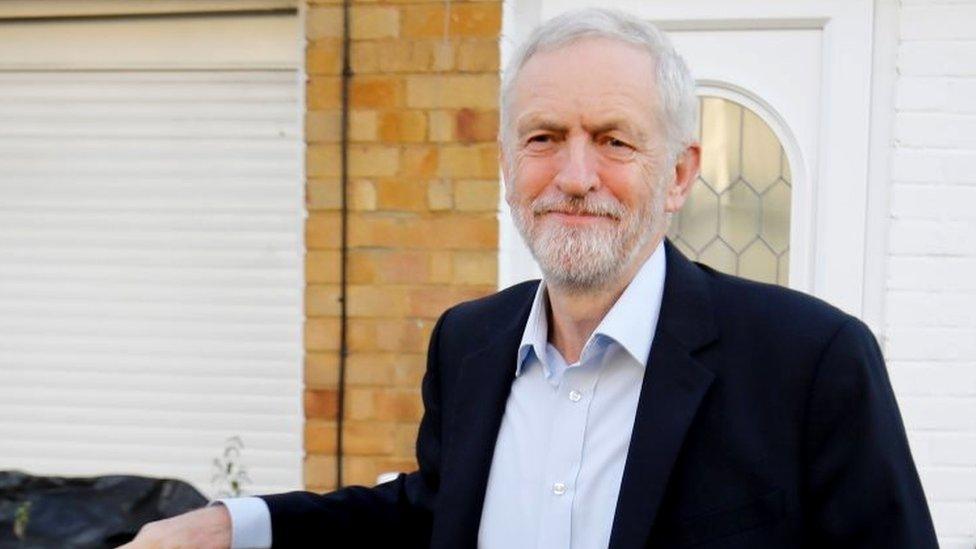'Difficult' Brexit talks see no breakthrough, European Commission says
- Published
- comments

Michel Barnier is leading Brexit talks on behalf of the European Commission
Brexit negotiations "have been difficult" and "no solution has been identified" to the Irish backstop, the European Commission has said.
It comes after the latest talks between UK ministers and EU Brexit negotiator Michel Barnier in Brussels.
Commission spokesman Margaritis Schinas said the talks had taken place in a "constructive atmosphere" but there had been no breakthrough.
The UK is pushing for legally-binding changes to the EU deal.
Mr Schinas was speaking after Mr Barnier briefed the European Commission's weekly meeting on the state of Brexit talks.
Speaking after talks with Mr Barnier, the UK's Attorney General Geoffrey Cox said: "Both sides have exchanged robust, strong views. We're now facing the real discussions. Talks will be resuming soon."
He added: "We're into the meat of the matter, we've put forward very reasonable proposals."
Liam Fox says leaving the EU without a deal would be "hugely sub-optimal, compared to getting a deal".
Steve Brine: "The idea of some sort of clean break...is utter nonsense."
Downing Street echoed Mr Barnier's characterisation of the talks as "difficult", but said the negotiations were "ongoing".
"The EU continues to say that it wants this to be resolved and that it wants the UK to leave with a deal. Parliament has been clear that for this to happen, we require legally-binding changes which mean that the UK can't be trapped in the backstop indefinitely," said the PM's official spokesman.
"That is what we will continue to pursue."
The backstop is an insurance policy - designed to avoid a hard border "under all circumstances" - between Northern Ireland and the Irish Republic.
Prime Minister Theresa May is pinning her hopes on getting changes to it that will prevent the UK from being tied to EU customs rules if no permanent trade deal is agreed after Brexit.
She believes this would be enough to get MPs - who last month rejected her deal by an historic margin - to back her deal in a vote she has promised on or before 12 March.
Confused by Brexit jargon? Reality Check unpacks the basics.
But the EU has consistently refused to rewrite the deal it has struck with Mrs May, which is meant to ensure an orderly departure from the bloc on 29 March and pave the way for trade talks.
And Mr Barnier repeated that message to EU leaders, according to Mr Schinas.
"Discussions have been difficult and no solution has been identified to that is consistent with the withdrawal agreement, including the Northern Ireland protocol which, as you know, will not be reopened," he said at a press conference in Brussels.
BBC Brussels reporter Adam Fleming explained that EU sources said the UK side couldn't guarantee that whatever might end up being agreed in Brussels would even get through Parliament.

Jeremy Corbyn is meeting Tory MPs to discuss a Norway-style Brexit
Mrs May is also hoping to attract votes from Labour MPs in Leave-voting areas of the UK, as she battles to get her deal through the Commons.
She is promising MPs a vote on any changes to workers' rights after Brexit.
No 10 said Parliament would be given a say over whether to adopt any new protections introduced on the continent and to stay aligned with EU standards.
Labour MPs have been seeking assurances the UK will not fall behind EU standards after Brexit.
But trade unions said the MPs should not be "taken in by blatant window dressing" and the assurances on workers' rights were "not worth the paper they are written on".
Meanwhile, Labour leader Jeremy Corbyn has met Conservative MPs who back a close, Norway-style relationship with the EU after Brexit.
He discussed the idea of a "Common Market 2.0" trade-focused model with former ministers Nick Boles and Sir Oliver Letwin.
Mr Boles said the goal was to reach a cross-party compromise to ensure the UK left the EU but in a manner which protected its economic interests.
Allow X content?
This article contains content provided by X. We ask for your permission before anything is loaded, as they may be using cookies and other technologies. You may want to read X’s cookie policy, external and privacy policy, external before accepting. To view this content choose ‘accept and continue’.
The Labour spokesman said the meeting was to "discuss how to achieve a deal that would be good for jobs and could bring Leave and Remain voters together".
The meeting comes after Mr Corbyn and the main business organisations - the CBI, the Institute of Directors, the Federation of Small Businesses, the British Chambers of Commerce and Make UK - met on Tuesday to discuss Labour's Brexit plan based on a customs union with the EU.
